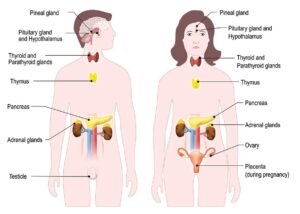
7 Factors That Cause Hormonal Imbalance In Your Body
The human body is a remarkably intricate system, relying on a delicate balance of hormones to keep us in tip-top shape, from managing our metabolism to influencing our mood. When these hormones fall out of balance, it can have profound effects on our health and overall wellness. Let’s dive into the world of hormones and explore the factors that can disrupt this delicate equilibrium.
Understanding Hormones
Hormones are like the body’s messengers, produced by various organs within the endocrine system. These messengers play a pivotal role in orchestrating and coordinating a wide array of physiological processes. They act as signaling molecules, conveying instructions to specific cells and tissues, and dictating their functions and responses.

What Causes Hormone Disruption?
Poor Sleep
Inadequate sleep can significantly disrupt our hormonal balance. When we don’t get enough sleep, it throws off the body’s natural circadian rhythms (Circadian rhythms are physical, mental, and behavioral changes that follow a 24-hour cycle, such as the release of hormones), affecting the release of hormones. One key hormone affected is melatonin, which regulates sleep and wake cycles. A lack of sleep can lead to reduced melatonin production, potentially disrupting other hormones like cortisol and insulin. This imbalance can result in increased stress, weight gain, and metabolic issues.
Diet
Our dietary choices are a crucial factor in hormonal balance. Highly processed and inorganic foods are often loaded with additives and preservatives that contain toxins. For instance, processed foods high in added sugars can cause rapid spikes and crashes in blood sugar levels, leading to fluctuations in insulin production.
Moreover, inorganic or conventionally grown foods may contain pesticide residues that can act as endocrine disruptors, affecting hormones such as thyroid hormones. These dietary factors can lead to imbalances in insulin, thyroid, and other hormones, contributing to weight gain, energy level fluctuations, and metabolic issues.
Stress
Stress, whether due to work, personal life, or other factors, can be a significant disruptor of hormonal balance. The body’s response to stress involves the release of cortisol, which can be beneficial in short-term situations.
However, chronic stress leads to prolonged elevated cortisol levels, which can negatively impact the endocrine system. This can lead to imbalances in insulin, thyroid hormones, and sex hormones, resulting in weight gain, insulin resistance, and disruptions in the menstrual cycle.
Mensturation/Pregnancy
Fluctuations in hormonal levels are entirely normal during the menstrual cycle and pregnancy. During menstruation, there is a natural variation in estrogen and progesterone levels, which can result in symptoms like mood swings and bloating. In pregnancy, significant hormonal changes occur, with a surge in hormones like human chorionic gonadotropin (hCG) and progesterone. While these changes are usually adaptive, they can lead to temporary imbalances, affecting mood, energy levels, and various physical symptoms.
Injury

Diabetes
Diabetes is a metabolic disorder characterized by abnormal blood sugar regulation. In type 1 diabetes, the body’s immune system attacks and destroys the insulin-producing cells in the pancreas. In type 2 diabetes, the body becomes resistant to the effects of insulin. These disruptions in insulin, a vital hormone for regulating blood sugar, lead to uncontrolled glucose levels. In turn, this can result in imbalances in other hormones such as cortisol and growth hormone. These imbalances can lead to symptoms like weight changes, fatigue, and impaired wound healing.
Medication
Certain medications can directly or indirectly affect the hormonal balance in our bodies. For example, corticosteroids, often prescribed to manage inflammation, can elevate cortisol levels, causing disruptions in other hormones. Hormonal contraceptives, such as birth control pills, can introduce external hormones that modify the body’s natural hormone levels. This can lead to changes in menstrual patterns and other hormonal imbalances. Additionally, medications for conditions like depression and anxiety can impact the balance of neurotransmitters, indirectly influencing hormonal regulation and mood.
In conclusion, stress, menstruation/pregnancy, injury, diabetes, and medication can all contribute to hormonal imbalances through various mechanisms. These imbalances can lead to a wide range of symptoms and health issues, underscoring the importance of understanding the underlying causes and seeking appropriate management and treatment when necessary. It’s essential to consult with healthcare professionals to address hormonal imbalances and their potential effects on overall well-being. Your journey to hormonal harmony starts with knowledge and action.
Schedule a FREE Consultation
If you are concerened about your hormonal imbalances, feel free to book a free consultation with our experts to put you on the right path!




